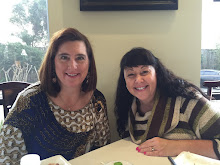I took pages and pages of notes. Thank goodness I had the weekend to process everything I learned. Here are just a few of the highlights:
The Units of Study were written for us to teach
authentic writing. Writing that exists
in a library or a book store – writing that is written for an audience. This is public, published writing – not
personal journal writing.
Students will gradually develop their knowledge of
conventions. First accept their approximations
and then correct them.
Teach students skills and multiple strategies to do
them. We need multiple strategies. For example, writing with a strong lead is
the skill (what to do). Strategies to do
this (how to do) include setting the scene with weather, starting with a moment
of action, starting with the character’s dialogue, etc.
Writing is a process. The less sophisticated the writer is… the
more stories he/she will need to produce.
Students will go through the process independently. Kindegarteners will produce a lot more
stories than second graders. Students
need to go through the process many times and will learn something new each
time. As the children have more ideas
and develop an understanding on conventions, etc. they will take longer on
their writing. (Gather ideasà
Draft à
Revise à
Edit à
Gather ideas à Draft à
Revise, etc.) Start new writing, instead
of making “this” piece better, teach them to make the “next” piece better.
Students need many pieces of writing, not one long
story. They need practice generating
lots of ideas. Ask them, “Where do you
go all the time? What do you see all the
time? What do you do all the time?”
Children need to write independently and be able to
work through the process. Have a writing
center in your classroom. Release your
control and allow children access to what they need. Your just right paper should have a few more
lines than you can fill up in your first go around. Children will need paper choices. Even second graders should be writing across
many pages. Each thought belongs on a
page. This is to give them a sense of
writing in paragraphs.
Celebrate the work not just the finished product.
For every flap, re-write, edit, cross out, etc.
that is a place where you've grown as a writer. You've made your work better.
Mid-workshop editing break. As adults, we write and edit as we go. It’s a habit of mind. To help teach this to children, stop during
the writing time and tell them you are going to have a 1 minute editing
break. Set the timer for 1 minute while
everyone reads their work looking for a specific thing to edit – could be
capital I, could be punctuation. Make
the necessary edits then and there and move on after a minute passes.
Strategies to Habits: put a piece of computer paper in a page
protector and divide it into four squares.
Each section should have a post it note with an individual writing goal
in it. Check these goals during writing
conferences. When the strategy has
become a habit move to a poster/chart/pocket.
No more than four at a time. Look
What We've Accomplished!
During a teacher meeting this week, I presented what I learned to my second grade ELA team. We all left the meeting with renewed writing and teaching energy!
If you ever have the chance to learn from these trail blazing professionals at TCRWP, I highly suggest you take it!
.JPG)





2 comments:
Isn't Lucy just full of wisdom? I too have a hard time keeping up with the notetaking during her sessions. I always learn something new. Thanks for sharing the Strategies to Habits technique. Can't wait to try that one!
Thank you for sharing your learning with other Lori! I know your team left inspired and your post will touch so many others!
Post a Comment